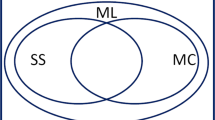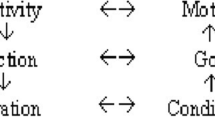Abstract
This paper describes certain interactions between the activity of “teaching” and the activity of “researching” in which the teachers participate in a 52-h professional development course aiming to introduce them to research in mathematics education as a tool for inquiry in their teaching. The teachers are involved in different research tasks such as: reading and presenting research papers; analyzing classroom dialogues and tasks; and designing, implementing, and evaluating collaboratively a classroom teaching intervention. From an activity theory (AT) perspective, and in particular Engeström’s (2001) third generation AT, distinguish two activity systems, the activity system of research and the activity system of teaching, to identify links that the participating teachers make. These links indicate the development of an inquiring stance to mathematics teaching and learning as a means of professional learning.


Similar content being viewed by others
References
Abboud-Blanchard, M., Cazes, C., & Vandebrouck, F. (2007). Teachers’ activity in exercises-based lessons: Some case studies. In D. Pitta-Pantazi & G. Philippou (Eds.), Proceedings of the fifth congress of the European Society for research in mathematics education (pp. 1827–1836). Cyprus: University of Cyprus.
Boaler, J. (2008). Bridging the gap between research and practice: International examples of success. In M. Menghini, F. Furinghetti, L. Giacardi, & F. Arzarello (Eds.), The first century of the International Commission of Mathematical Instruction. Rome: Proprieta artistic e letteraria Riservata.
Chapman, O., & Heater, B. (2010). Understanding change through a high school mathematics teacher’s journey to inquiry-based teaching. Journal of Mathematics Teacher Education, 13, 445–458.
Christiansen, B., & Walther, G. (1986). Task and activity. In B. Christiansen, B. Howson, & M. Otte (Eds.), Perspectives on mathematics education (pp. 243–307). Dordrecht: Reidel.
Daniels, H. (2008). Vygotsky and research. Oxford: Routledge.
de Freitas, E., Wagner, D., Esmonde, I., Knipping, C., Lunney Borden, L., & Reid, D. (2012). Exploring authority and positioning in mathematics classroom discourse: Workshop activities for teacher professional development. Canadian Journal of Science, Mathematics and Technology Education, 12(2), 137–159.
Edwards, T. G., & Hensien, S. M. (1999). Changing instructional practice through action research. Journal of Mathematics Teacher Education, 2, 187–206.
Engeström, Y. (1987). Learning by expanding: An activity-theoretical approach to developmental research. Helsinki: Orienta-Konsultit.
Engeström, Y. (1994). Teachers as collaborative thinkers: Activity-theoretical study of an innovative teacher team. In I. Carlgren, G. Handal, & S. Vaage (Eds.), Teachers’ minds and actions (pp. 43–61). London: Falmer.
Engeström, Y. (2001). Expansive learning at work: Toward an activity theoretical reconceptualization. Journal of Education and Work, 14, 133–156.
Engeström, Y. (2008). From teams to knots: Activity-theoretical studies of collaboration and learning at work. Cambridge: Cambridge University Press.
Garcia, M., Sanchez, V., Escudero, I., & Llinares, S. (2006). The dialectic relationship between research and practice in mathematics teacher education. Journal of Mathematics Teacher Education, 9, 109–128.
Gee, J. M. (2001). Identity as an analytic lens for research in education. Review of Research in Education, 25, 99–125.
Hart, L. C., Alston, A., & Murata, A. (2011). Lesson study research and practice in mathematics education. Dordrecht: Springer.
Jaworski, B. (2003). Research practice into/influencing mathematics teaching and teacher development: Towards a theoretical framework based on co-learning partnerships. Educational Studies in Mathematics, 54, 249–252.
Jaworski, B. (2006). Theory and practice in mathematics teaching development: Critical inquiry as a mode of learning in teaching. Journal of Mathematics Teacher Education, 9, 187–211.
Jaworski, B., & Goodchild, S. (2006). Inquiry community in an activity theory frame. In J. Navotná, H. Moraová, M. Krátká, & N. Stehliková (Eds.), Proceedings of the 30th conference of the International Group for the Psychology of Mathematics Education (Vol. 3, pp. 353–360). Prague: Charles University.
Jaworski, B., & Potari, D. (2009). Bridging the macro- and micro-divide: Using an activity theory model to capture sociocultural complexity in mathematics teaching and its development. Educational Studies in Mathematics, 72, 219–236.
Jaworski, B., Robinson, G., Matthews, J., & Croft, T. (2013). Issues in teaching mathematics to engineering students to promote conceptual understanding: A study of the use of GeoGebra and inquiry-based tasks. International Journal for Technology in Mathematics Education. Special issue “Activity theoretic approaches to technology-enhanced mathematics learning orchestration” (to appear).
Krainer, K. (2003). Teams, communities and networks. Journal of Mathematics Teacher Education, 6, 93–105.
Krainer, K. (2011). Teachers as stakeholders in mathematics education research. In B. Ubuz (Ed.), Proceedings of the 35th conference of the International Group for the Psychology of Mathematics Education (Vol. 1, pp. 47–62). Ankara: PME.
Lave, J., & Wenger, E. (1991). Situated learning: Legitimate peripheral participation. Cambridge: Cambridge University Press.
Leont’ev, A. N. (1978). Activity, consciousness and personality. Englewood Cliffs: Prentice Hall.
Mellin-Olsen, S. (1987). The politics of mathematics education. Dordrecht: Reidel.
Pitkethly, A., & Hunting, R. (1996). A review of recent research in the area of initial fraction concepts. Educational Studies in Mathematics, 30, 5–38.
Ponte, J. P. (2012). A practice-oriented professional development programme to support the introduction of a new mathematics curriculum in Portugal. Journal of Mathematics Teacher Education (online first).
Potari, D., Sakonidis, H., Chatzigoula, R., & Manaridis, A. (2010). Teachers’ and researchers’ collaboration in analysing mathematics teaching: A context for professional reflection and development. Journal of Mathematics Teacher Education, 13, 473–485.
Pozzi, S., Noss, R., & Hoyles, C. (1998). Tools in practice, mathematics in use. Educational Studies in Mathematics, 36(2), 105–122.
Roth, W. M. (2005). Mathematical inscriptions and the reflexive elaboration of understanding: An ethnography of graphing and numeracy in a fish hatchery. Mathematical Thinking and Learning, 7(2), 135–170.
Ruthven, K. (2000). Linking researching with teaching: Towards synergy of scholarly and craft knowledge. In L. D. English (Ed.), Handbook of international research in mathematics education (pp. 581–598). New Jersey: LEA.
Sfard, A., & Prusak, A. (2005). Telling identities: In search of an analytic tool for investigating learning as a culturally shaped activity. Educational Researcher, 34, 14–22.
Skott, J. (2010). Shifting the direction of belief research: From beliefs to patterns of participation. In M. F. Pinto & T. F. Kawasaki (Eds.), Proceedings of the 34th conference of the International Group for the Psychology of Mathematics Education (Vol. 4, pp. 193–200). Brazil: PME.
Steffe, L. P. (2004). On the construction of learning trajectories of children: The case of commensurate fractions. Mathematical Thinking and Learning, 6, 129–162.
Tabach, M. (2005). Research and teaching—Can one person do both? A case study. In J. Novotná, H. Moraová, M. Krátká, & N. Stehlíková (Eds.), Proceedings of the 30th conference of the International Group for the Psychology of Mathematics Education (Vol. 5, pp. 233–240). Prague: PME.
Triantafillou, C., & Potari, D. (2010). Mathematical practices in a technological workplace: The role of tools. Educational Studies in Mathematics, 74(3), 275.
Watson, A., & Mason, J. (2007). Taken as shared: A review of common assumptions about mathematical tasks in teacher education. Journal of Mathematics Teacher Education, 19, 206–215.
Wenger, E. (1998). Communities of practice: Learning, meaning and identity. Cambridge: Cambridge University Press.
Williams, J. S., & Wake, G. D. (2007). Black boxes in workplace mathematics. Educational Studies in Mathematics, 64, 317–343.
Author information
Authors and Affiliations
Corresponding author
Rights and permissions
About this article
Cite this article
Potari, D. The relationship of theory and practice in mathematics teacher professional development: an activity theory perspective. ZDM Mathematics Education 45, 507–519 (2013). https://doi.org/10.1007/s11858-013-0498-2
Accepted:
Published:
Issue Date:
DOI: https://doi.org/10.1007/s11858-013-0498-2




